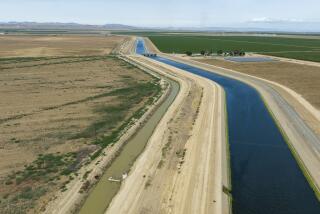Clinton Proposes More Money to Protect Lands; Denial Likely
- Share via
WASHINGTON — President Clinton will ask Congress today for a $570-million increase in federal land acquisition and protection funds, the biggest such increase in U.S. history for the protection of land resources, White House officials said Monday.
The $1-billion program--representing a 125% rise over the $459 million approved for fiscal 1999 would fully finance the federal Land and Water Conservation Fund for the first time in recent memory and expand federally protected parkland, some of it in California.
Clinton and Vice President Al Gore are slated to unveil the plan at a ceremony at the National Arboretum in Washington. The White House has been leaking portions of the fiscal 2000 budget, due out in February, in an effort to score political gains.
The White House also is expected to announce several modest job-training initiatives today, including a $60-million plan to finance new regional coalitions aimed at identifying skill shortages and providing training to help workers fill available jobs.
On Monday, Gore unveiled a series of proposals designed to help urban communities work together to protect green space, reduce sprawl and ease traffic. The White House wants to spend $700 million over five years to provide interest-free loans to cities.
However, congressional analysts said despite Clinton’s efforts, the Republican-controlled Congress is unlikely to approve either the increase in land-acquisition funds or many of the job-training programs the president is proposing.
GOP lawmakers have turned down similar requests in the past, and the administration’s clout on Capitol Hill has been diminished by the impeachment imbroglio. Most Congress-watchers expect lawmakers to eschew almost everything but key appropriations bills.
The lands initiative would include money for acquiring additions to three major federal properties in California--450,000 acres around the Mojave National Preserve and Joshua Tree National Parks; a parcel in the Santa Monica Mountains and additions to the San Diego National Wildlife Refuge.
The Mojave Desert plan, advanced by the group the Wildlands Conservancy, would be the largest such acquisition in California history. The land would come from the Catellus Development Corp., formerly the real estate arm of the Santa Fe Pacific Corp., which agreed to the transfer on Monday.
Clinton’s overall proposal would provide $442 million for federal land-acquisition programs--up from $343 million in fiscal 1999--and $588 million to underwrite matching grants for states for land-acquisition, planning, farmland protection, urban parks and forest protection--up from $116 million in fiscal 1999.
Fiscal 2000 begins Oct. 1.
In addition, Clinton is expected to seek more money to help states protect ocean and coastal resources--$90 million for coastal lands, $45 million for reefs, fisheries and marine habitats, $29 million for national marine sanctuaries and $19 million for estuary protection.
News of the president’s proposal drew immediate praise from environmental groups. Bill Eichbaum, vice president of the World Wildlife Fund, said the administration was “moving very far” to restore money previously withheld by Congress.
The federal Land and Water Conservation Fund, created in 1964, was supposed to have been maintained at a $900-million-a-year level, but was cut back in the early 1990s after the House Appropriations Committee called for a moratorium on further federal land purchases.
The $60-million job-creation initiative would provide $13 million to create 20 regional, business-led coalitions that are intended to harmonize local job-training efforts with the needs of employers.
The plan also proposes an estimated additional $47 million in matching grants to the consortia to train workers for industries that are facing skill shortages.
The matching grants would be funded by a $500 fee that Congress and the administration last fall agreed to impose on employers--many of them in Silicon Valley--in exchange for allowing them to import more highly skilled workers from abroad. That fee is estimated to produce $47 million in revenue next year.
More to Read
Get the L.A. Times Politics newsletter
Deeply reported insights into legislation, politics and policy from Sacramento, Washington and beyond. In your inbox twice per week.
You may occasionally receive promotional content from the Los Angeles Times.










